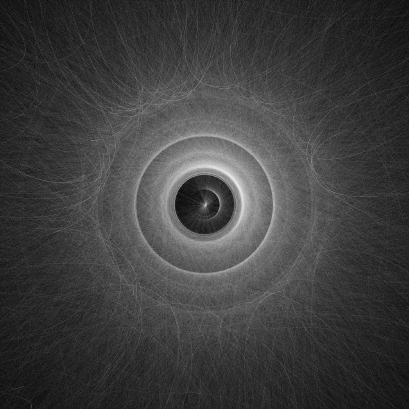Quadrature (talk | contribs) mNo edit summary |
Quadrature (talk | contribs) mNo edit summary |
||
| Line 1: | Line 1: | ||
[[File:Orbits@Quadrature@credit-Quadrature.png|thumb|409x409px|Still von audiovisual performance Orbits, based on data from satellites and their trash.]] | |||
The project recognizes the diverse forms of data – private, public, environmental, live, stored, secret, past, present, and future - sourced from sensors, apps, science, governments, societies, and personal experiences. The abundance of data invites us to excavate relevant bits from the trivia pile, unveiling patterns and narratives within time and space. Unlike traditional academic research, artistic research within this project aims not to uncover a single truth but to provide subjective narratives, speculative statements, or even purely poetic approaches: Data as Dada; artistic reflection instead of standard visualisations; analysing data settings rather than data sets. | |||
The project will involve discussions on various data and related artworks, viewing technology as a tool to read and write realities. The objective is to interpret, translate, and experiment with the numbers offered by the world around us – a practice of data literacy: curious, competent, critical, and creative approaches to data. In addition to various inputs by the lecturers, talks by other artists are planned. Details to be confirmed. | |||
Ultimately, this project encourages students to consider data as a new type of raw material, offering new aesthetic opportunities, extraordinary insights, and artistic expression. Emphasizing collaborative work, participants are expected to work in small teams to conceptualise, develop and realise a self-defined artwork. | |||
A field trip is planned (probably 30.05. - 02.06.) to Brandenburg countryside, offering students insights into the life of freelance artists and their natural habitat. Focus is on collaborative practice. | |||
Students are expected to be able and willing to work in a self-organised manner and to actively participate in the discourse of the module. | |||
'''Important: '''If you are interested to work with A.I., please also choose the Fachmodul "[https://www.uni-weimar.de/qisserver/rds?state=verpublish&status=init&vmfile=no&publishid=62251&moduleCall=webInfo&publishConfFile=webInfo&publishSubDir=veranstaltung&xmlheader=&menuid=editlectures Critique and (Artificial) Intelligence - Machine learning and critical theory]" by Dr. Alexander König! | |||
'''Meetings''': [http://rayzhekov.com/projects/fragile-perspectives/ Di, 09.15 -12.30 @ DBL] | |||
[http://rayzhekov.com/projects/fragile-perspectives/ First meeting Mo, 15.04. 18:00 (to be confirmed) + Di 16.04. 09:15 - 12:30] | |||
''' | '''Lectures by''': Juliane Götz, Sebastian Neitsch (Quadrature) >>> mail[@]quadrature.co | ||
'''====== Some Books ======''' | '''====== Some Books ======''' | ||
Revision as of 17:08, 6 April 2024
The project recognizes the diverse forms of data – private, public, environmental, live, stored, secret, past, present, and future - sourced from sensors, apps, science, governments, societies, and personal experiences. The abundance of data invites us to excavate relevant bits from the trivia pile, unveiling patterns and narratives within time and space. Unlike traditional academic research, artistic research within this project aims not to uncover a single truth but to provide subjective narratives, speculative statements, or even purely poetic approaches: Data as Dada; artistic reflection instead of standard visualisations; analysing data settings rather than data sets.
The project will involve discussions on various data and related artworks, viewing technology as a tool to read and write realities. The objective is to interpret, translate, and experiment with the numbers offered by the world around us – a practice of data literacy: curious, competent, critical, and creative approaches to data. In addition to various inputs by the lecturers, talks by other artists are planned. Details to be confirmed.
Ultimately, this project encourages students to consider data as a new type of raw material, offering new aesthetic opportunities, extraordinary insights, and artistic expression. Emphasizing collaborative work, participants are expected to work in small teams to conceptualise, develop and realise a self-defined artwork.
A field trip is planned (probably 30.05. - 02.06.) to Brandenburg countryside, offering students insights into the life of freelance artists and their natural habitat. Focus is on collaborative practice.
Students are expected to be able and willing to work in a self-organised manner and to actively participate in the discourse of the module.
Important: If you are interested to work with A.I., please also choose the Fachmodul "Critique and (Artificial) Intelligence - Machine learning and critical theory" by Dr. Alexander König!
Meetings: Di, 09.15 -12.30 @ DBL
First meeting Mo, 15.04. 18:00 (to be confirmed) + Di 16.04. 09:15 - 12:30
Lectures by: Juliane Götz, Sebastian Neitsch (Quadrature) >>> mail[@]quadrature.co
====== Some Books ======
John D. Kelleher, Brendan Tierney: Data Science, ISBN 978-0-262-53543-4
Catherine D'Ignazio, Lauren F. Klein: Data Feminism, ISBN 978-0-262-54718-5
Christoph Grünberger: The Age of Data Luci Pangrazio, Neil Selwyn: Critical Data Literacies
Thomas Piketty: Eine kurze Geschichte der Gleichheit
====== Some Artists / Artworks ======
